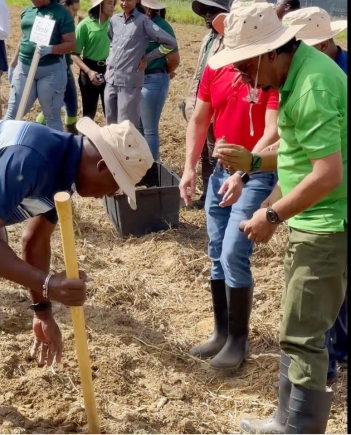adverts
Trinidad and Tobago has taken a significant step toward reducing its food import bill and promoting local agriculture following Prime Minister Dr. Keith Rowley’s visit to Ghana.
The West African nation has gifted the country 10,000 yam seeds, which will be cultivated across both islands as part of efforts to enhance food security and reduce dependency on imported staples.
Dr. Rowley, speaking at the Tucker Valley Shade House, Chaguaramas Agricultural Park, on Friday, highlighted the importance of this initiative in addressing the nation’s growing reliance on foreign food supplies.
adverts
“We recently received as a gift from Dr. Mitchell and the Ghanaian authorities 10,000 units of planting material of four varieties of yams,” Rowley announced. “We are introducing these varieties into Trinidad and Tobago now, and I believe this initiative will have far-reaching contributions to reducing our food import bill.”
Trinidad and Tobago currently spends billions of dollars annually on food imports, with white potatoes—commonly known as Irish potatoes—being a major staple in local diets. The Prime Minister emphasised that one of the key objectives of introducing Ghanaian yams is to replace imported foods with locally grown alternatives.
“If you talk to anybody in this country about food imports, they will tell you we import too much of our food, and we need to reduce our food import bill,” Rowley said. “But that objective can only be achieved in two ways: if we produce more food locally and if we consume what we produce.”
He added that shifting dietary preferences towards ground provisions, such as yams, could be instrumental in changing the way Trinidadians and Tobagonians eat.
“While I was in Ghana, I was able to sample a number of these white yams—smooth, soft, beautifully tasting yams—which can replace the white potatoes we import from Canada,” he explained. “A lot of what we consume can be replaced by yams, and the older generation will tell you that boiled yam, alongside stews and vegetables, used to be a common part of our diet. Over time, we have lost that, but now we are aiming to bring it back.”
The government has already begun planting the first batch of yams in select areas across Trinidad and Tobago. According to Rowley, planting has commenced in the western part of Tobago, and in the coming weeks, Mason Hall and other locations will also be included in the cultivation process.
The prime minister explained that the goal is to assess which soil types and climatic conditions are best suited for the different varieties before full-scale production begins.
“These yams will be planted in different areas so that we can determine the best growing conditions. We want to make sure that when we expand cultivation, we are doing so in the most efficient and productive way possible,” he stated.
Rowley emphasised that beyond planting the yams, it is crucial to ensure that they are embraced by both farmers and consumers.
“We need to improve our gene pool by bringing in better genetic quality, testing them here, conducting our own research, and selecting the best varieties for local conditions,” he explained. “Once we have done that, we can confidently encourage our farmers to plant these yams, knowing they will thrive in our environment.”
The prime minister also made a passionate appeal to citizens to embrace locally grown produce and incorporate yams into their diets, stressing that reducing food imports requires a national effort.
“We want to grow what we eat and eat what we grow,” Rowley declared. “This is the only way we can significantly impact the food import bill—by having more food grown locally and consumed by our people. These yams are now in our hands, and as we grow them, we won’t have to spend any foreign exchange on them. The only thing left is for us to actually eat them.”
Rowley reaffirmed his government’s commitment to revitalising Trinidad and Tobago’s agricultural sector, particularly in ensuring food sustainability and security.
“The reality is that food security is a national priority, and we must take decisive steps to ensure that we are producing as much food locally as possible,” he stated. “This yam initiative is one of many efforts to make sure we achieve that goal.”
The prime minister further indicated that as the yam project progresses, the government will continue working with local farmers, agricultural experts, and research institutions to enhance production efficiency and ensure long-term sustainability.
With an estimated harvest time of six to nine months, Rowley expressed optimism that the country will soon see the benefits of this initiative.
“We are looking forward to the first harvest, and when that time comes, I hope we will see a shift in how we approach our food choices,” he said. “These yams come from Ghana, a country with a deep agricultural heritage, and they are a symbol of the friendship and cooperation between our two nations.”
Also present at the event were Prime Minister-designate Stuart Young, Minister of Youth Development and National Service Foster Cummings, Minister of Agriculture, Land and Fisheries Kazim Hosein, and Minister in the Ministry of Agriculture Avinash Singh.
With the government’s commitment and public support, the introduction of Ghanaian yams could mark a turning point in Trinidad and Tobago’s push for greater food self-sufficiency and a healthier national diet.
GOT A STORY?
Contact/WhatsApp: +233243201960 or Email: manuelnkansah33@gmail.com


